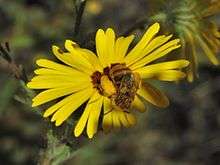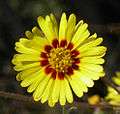Madia elegans
Madia elegans is an annual herbaceous plant species in the daisy family. It is generally known as the common madia, but there are several subspecies known by various common names.[1]
| Madia elegans | |
|---|---|
 | |
| Scientific classification | |
| Kingdom: | |
| (unranked): | |
| (unranked): | |
| (unranked): | |
| Order: | |
| Family: | |
| Genus: | |
| Species: | M. elegans |
| Binomial name | |
| Madia elegans | |
Range
The Madia elegans plant is native to western North America from south-central Washington (state) to northern Baja California.[2][1][3][4] It may be found in dry open forest, disturbed areas and grasslands from low to high elevations.[2]
Description
Madia elegans is covered with short, stiff hairs. Glands are borne on stalks, especially near the flowers.[1] The showy flower varies in appearance across subspecies and even within subspecies. Typically, it is a bright yellow daisy-like bloom with numerous thin ray flowers and several central disk flowers. It may be solid lemon yellow or have a center of a different color, from white to maroon. Several strongly scented, uncrowded, flower heads grow at the end of a slender green stem. The ray flowers curl up during the daytime, opening in the late afternoon and staying open all night until mid-morning. It flowers from April through early November.[2] Its fruits are achenes which were historically used as food by Native Americans, including the Pomo and Miwok, who baked them or ground them into flour.
The foliage exudes a fragrant oil, hence the common name of tarweed.
Subspecies
- M. e. densifolia - showy tarweed
- M. e. elegans - common madia
- M. e. vernalis - spring madia
- M. e. wheeleri - Wheeler's tarweed
Image gallery
References
- Giblin, David (Editor) (2015). "Madia elegans". WTU Herbarium Image Collection. Burke Museum, University of Washington. Retrieved 2015-01-17.CS1 maint: extra text: authors list (link)
- Sullivan, Steven. K. (2015). "Madia elegans". Wildflower Search. Retrieved 2015-01-17.
- "Madia elegans". PLANTS Database. United States Department of Agriculture; Natural Resources Conservation Service. 2015. Retrieved 2015-01-17.
- Hogan, C. Michael (curator). "Madia elegans". Encyclopedia of Life. Retrieved 2015-01-18.
External links


- Jepson Manual Treatment: Madia elegans
- U. of Michigan Ethnobotany: Madia elegans
- Madia elegans — CalPhotos gallery


